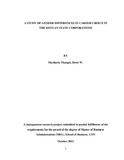| dc.description.abstract | The research objective was to study the gender differences in career choice in the Kenyan State Corporations. The study was a descriptive one which was appropriate because of the cross-sectional nature of data to be collected and the comparative analysis that was implied in the research objective. Cooper and Schindler (2003) observed that descriptive studies are concerned with finding out the what, where, who and how of a phenomenon which was the focus of the study on gender differences in career choice in the Kenyan State Corporations.
The population of the study comprised all one hundred and eighty four (184) state corporations in Kenya registered with the Inspectorate of State Corporations. The study used sampling, where for each of the 184 State Corporations, 2 Questionnaires were given to the Officer in charge of Human Resources who was used to identify the 2 respondents; one male and one female senior manager. The total respondents were three hundred and sixty eight (368). Out of these, two hundred and forty five (245) respondents were able to participate in the study. The data collection instrument was a self administered semi-structured questionnaire.
The data collected was analyzed using descriptive statistics such as mean, standard deviation, frequencies and percentages. Data was summarized and presented in the form of tables and charts. Chi-square technique was used to test for the difference between male and female respondents in career choice. The key findings indicate that gender differences in career choice exist in relation to cultural background and upbringing, marital status, lack of ability or support to pursue careers of choice, perceived support received from both male and female bosses, discrimination at the workplace on the basis of gender, gender restrictions placed on career progression moves, organizational practices that are considered to have a negative impact on gender equality in career choice and education preferences of parents/guardians.
In view of the findings discussed in Chapter Four, it can be concluded that gender differences in career choice will exist for as long as the labour force is segregated by gender. Discriminatory practices on the basis of gender, restrictions placed on career progression moves on the grounds of gender and organizational practices that are considered to have a negative impact on gender equality in career choice will affect career choices. It can also be concluded that the push for gender balance could pose a challenge for the career choice of men working in state corporations in Kenya. | en_US |

